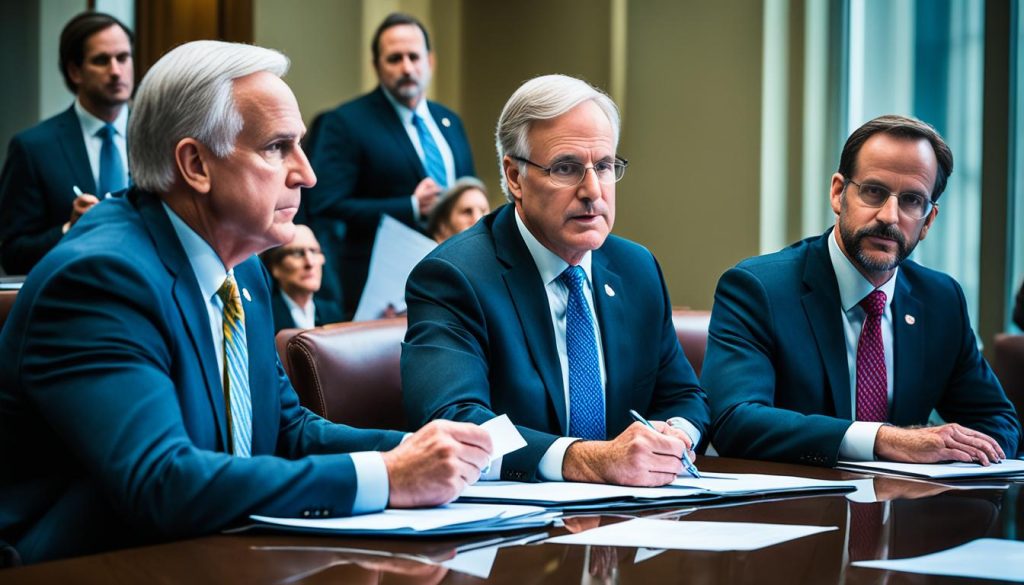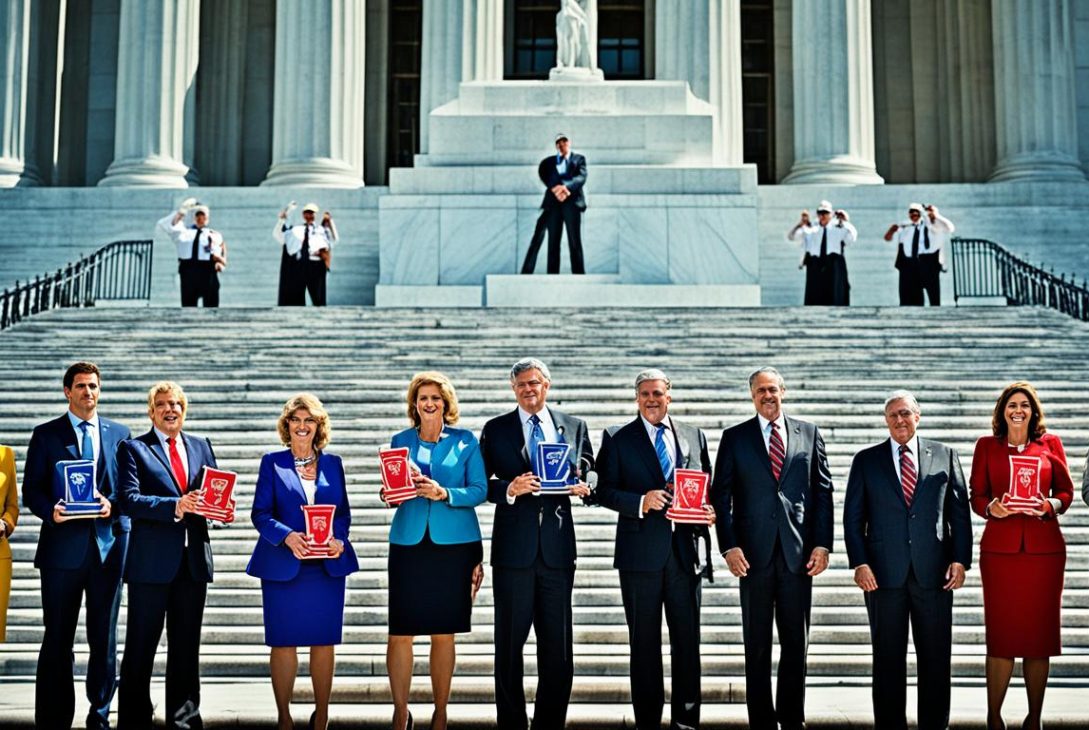In our system, lawmakers play a vital role. They’re elected to create, discuss, and approve laws that affect our lives. We know them by different names, like congressmen, senators, and representatives. They are our political leaders, speaking for our needs and desires. They work hard in the legislative process to make our voices heard.
But their job isn’t just about making policies. It’s about protecting what we believe in. Through these laws, they try to solve big social problems. This way, lawmakers change the lives of many, affecting our country’s future.
Key Points
- Lawmakers are elected government officials responsible for drafting, debating, and enacting laws that shape various aspects of society.
- They serve as the voice of their constituents, advocating for their interests and addressing their concerns through the legislative process.
- Lawmakers have the power to impact the lives of citizens through the laws they create and the policies they shape.
- Their role involves carefully crafting legislation that addresses pressing societal issues and upholds the values and aspirations of the people they serve.
- Lawmakers play a crucial role in shaping the trajectory of our nation’s future through their legislative decisions.
Legislative work can be tricky as they try to balance different opinions for the common good. Most places have a legislature with two parts, working together to decide on laws. Some states have their legislatures open all year. But, in others, lawmakers work part-time and don’t get full pay for their job.
The ACLU is active in every state, protecting our rights. They work closely with local policymakers to push for laws that respect our freedoms1. Often, groups that care about specific causes support lawmakers to make these laws happen1. The ACLU has fought in many court cases to defend our rights, and they have won important cases1.
Understanding the Role of Lawmakers
Lawmakers, also known as elected representatives, have a crucial job. They speak up for the constituent interests of those they serve. Their role is key in making sure their community’s needs are met. They work on shaping policies and enacting legislation to make real change in society.
Elected Representatives of the People
Lawmakers are elected representatives who speak on behalf of the people who elect them. There are 435 elected members and 6 non-voting members in the House. Each state has a certain number of members based on its population. The Senate has 100 Senators, with each state having 2.2 They ensure their people’s many views and worries are dealt with in making laws.
Advocacy for Constituent Interests
Lawmakers interact with the people they represent. They listen to what concerns them and defend their needs on various topics. They act as the links between the public and the government. This leads to creating policies and enacting legislation. They could be working on issues like the economy, healthcare, education, or civil rights. Lawmakers are vital in fighting for what their people care about.
Shaping Policies and Enacting Change
Lawmakers have the power to make laws that truly change things. They write bills, discuss them deeply, and then vote to decide if they become law.2 These bills must pass both the House and Senate by majority before the President signs them. This shows that making laws is a team effort.
They also help in choosing who fills key government roles and deciding on treaties.2 The Senate can say yes to Presidential choices with a majority vote. But to approve treaties, it needs a supermajority vote. This shows how different branches of government work together.
By making laws and creating policies, lawmakers tackle big issues, encourage the economy, safeguard freedoms, and help shape their country’s future.
The Legislative Process in State Legislatures
In the United States, state legislatures are key to making laws. They work in a clear way to keep things open and make sure everyone can be held accountable. Most states follow a bicameral legislature setup, which means they have two parts – a smaller upper house and a larger lower house.
Bicameral Structure: Two Chambers, One Goal
This bicameral system exists to make sure no law is rushed through. Any bill has to pass both parts before it can become a law. This gives time for careful thought, talk, and changes to the proposed law to make it better for the people. The number of members in each state’s legislature can vary. For example, California has 120 members in each part, while Georgia has 236, and Montana has 150 members.3
Regular and Special Legislative Sessions
Legislatures hold regular sessions once a year or every two years to make laws. They discuss and vote on bills about many topics that affect the people they represent. Sometimes, when there’s an important, urgent, or unexpected issue, they have special sessions. These special meetings allow them to focus on that specific matter. The New York Legislature has 213 members, and in New Mexico, 112 members serve their communities during these important times.3
There are precise rules that guide how these sessions work. For example, many follow Mason’s Manual of Legislative Procedure. This manual is used by 77 out of the 99 state legislative bodies.3 Before regular sessions start, most places allow lawmakers to submit their bill ideas early, so they’re ready to go.3 Also, around 20% of these bodies limit how many bills each member can introduce. This helps keep the work focused and the process running smoothly.3
Each state decides how long its legislative sessions will be. For instance, in Colorado, there’s a rule since 1988 that limits the session to 120 days. This is done to make the legislative process more efficient.3 But no matter the time or method, state legislatures are vital in making the laws that apply to their states. These laws directly affect the lives of the people they represent.
State Legislation and Civil Rights
State legislatures are key in making laws that really affect people’s civil rights. They can create laws on big topics like reproductive rights, voting rights, and LGBTQ+ rights, including access to gender-affirming care.
Reproductive Freedom and Abortion Rights
State lawmakers can make laws that protect or limit reproductive rights and abortion rights. These laws really change how people access reproductive health services. They also impact folks’ choices about their bodies and futures.
The abortion rights debate is often heated. People have different views on how to balance individual and state rights.
Voting Protections and Suppression
Voting rights and fights over voter suppression are big in state legislation. They can set rules that help or hurt the right to vote. This includes laws on voter IDs, when you can vote early, and where polling places are located.
Making sure voting is fair and open is essential for a democratic society.
LGBTQ+ Rights and Gender-Affirming Care
State governments can change laws that affect LGBTQ+ people, like rules about discrimination, marriage, and rights for transgender individuals. They also decide how easy it is to get gender-affirming care, which is important for the transgender community.
The Civil Rights Act of 1875, led by Senator Charles Sumner in 1870, aimed to offer all Americans, no matter their race, equal access to places like schools and churches.4 The law passed in the Senate on February 27, 1875, with 38 yes votes against 26 no votes. It took effect on March 1, 1875, but was later ruled unconstitutional by the Supreme Court in 1883.4
The Supreme Court’s decision on the Civil Rights Cases was a step towards the Plessy v. Ferguson case in 1896. This led to the era of legal segregation known as Jim Crow.4
Lawmakers: Shaping Laws and Impacting Society
Lawmakers have a huge impact on society through the laws they create. They use their legislative powers to make laws. These laws cover civil rights, economics, education, and health.
State legislatures create way more bills than Congress. They turn more of these bills into law.5
The choices of lawmakers touch our lives every day, at both state and federal levels. State laws often affect us more directly than federal ones. They deal with local problems and are blocked less by political squabbles.5

- State legislatures have more sessions than Congress. This lets them deal with new issues quickly.5
- They tackle localized problems that hit close to home for their voters.5
Lawmakers can change our world by making legislation. This legislation can deal with big issues like civil rights and the economy. It also looks at education and health. Their choices change how we live, affecting everyone in our communities. And they help move our society forward.
Federal vs. State Legislation
Looking at legislation, there are big differences between federal and state levels. States often introduce way more volume of bills than the federal Congress, as seen in a study showing it can be up to 23 times more.5
Enactment of Bills into Law
Moreover, more bills make it into law at the state level than in Congress.5 This is because there’s less fighting between political parties and because states focus on what matters most to their people.
Localized Impact on Citizens’ Lives
State legislatures are closer to the citizens they serve. This proximity helps them deal with issues that hit home for their state’s people.5
Volume of Legislation Introduced
States introduce a huge volume of legislation, dwarfing what Congress deals with.5 It’s a clear sign that state laws have a big role in shaping our daily lives, no matter where we live in the country.
Staying Informed and Engaged
It’s important to stay informed and be involved in today’s changing laws. This helps make real changes. People can help by using resources, joining local activities, and helping advocacy groups. This way, they have a say in laws that affect them and their communities.
State Legislative Websites and Resources
State websites are key for those interested in legislation. They offer many useful tools. For example, they can track bills and watch live sessions. This keeps people well-informed on important issues. State sites also make it easy to find bills. The LENS system lets you set up bill progress alerts, and databases like Legiscan allow for easy searches.
Local News and Community Engagement
Local news and community meetings are also essential. They keep people up to date on laws. By attending meetings and talking to reporters, individuals learn about new laws. They also get to share their views on these laws. This is a great way to meet others who care too, making them feel part of a bigger group.
Advocacy Groups and Grassroots Efforts
Advocacy groups and grassroots efforts are big helpers for those who want to be informed. They teach us, gather support, and speak up for causes. Working with these groups strengthens your voice. You can join events and help decide what’s important. Grassroots efforts also make it possible to act locally. This builds a sense of community and shared responsibility.
By using legislative resources, staying updated with local news and joining community involvement, plus working with advocacy groups and grassroots efforts, people can really influence laws.6
Historical Impact of Landmark Legislation
In American history, lawmakers have made huge changes through landmark legislation. These laws have deeply affected the nation’s society and politics. Important laws include the Civil Rights Act of 1875, the Thirteenth, Fourteenth, and Fifteenth Amendments to the Constitution, and the Civil Rights Act of 1964.
The District of Columbia Compensated Emancipation Act
Enacted in 1862, the District of Columbia Compensated Emancipation Act marked an important turning point. It led to the end of slavery in Washington, D.C. This legislation not only freed enslaved people but also paid their former owners. It was a key step before the wider Emancipation Act.
The Thirteenth, Fourteenth, and Fifteenth Amendments
The Thirteenth, Fourteenth, and Fifteenth Constitutional amendments changed America. The Thirteenth Amendment, from 1865, ended slavery. The Fourteenth, from 1868, gave citizenship and equal rights to all, including ex-slaves. The Fifteenth, from 1870, made voting rights available regardless of race, color, or servitude.
Civil Rights Act of 1964
The Civil Rights Act of 1964 was a huge step forward. It aimed to stop discrimination in various aspects of life. This Act banned segregation in public spots and unfair hiring practices. It was a major victory for equal rights and fighting racial discrimination in the U.S.
The Civil Rights Act brought by Charles Sumner in 1870 set out to give everyone, no matter their color, access to certain places, like schools and churches.4 The Senate approved it on February 27, 1875, with a 38 to 26 vote, and it was enforced on March 1, 1875.4 It made sure everyone could fully and equally use public accommodations, from inns to theaters.4 But, in 1883, the Supreme Court ruled that law as invalid in the Civil Rights Cases. The Court felt only states, not people, could be regulated according to the Fourteenth Amendment.4 This ruling led to the Plessy v. Ferguson ruling in 1896, allowing segregation as long as things were ‘equal’.4
Defending Civil Liberties at the State Level
Organizations like the American Civil Liberties Union (ACLU) work hard. They fight for civil liberties at the state level. The ACLU uses legal battles and keeps track of attacks on rights. They also help empower voters. This makes sure people keep up with local elections and vote for those who protect freedom.
ACLU Strategies and Legal Battles
The ACLU has staff in every state that work with local leaders on rights issues.1 They’ve fought many state-level legal battles to keep rights safe. For example, they’ve challenged laws that limit reproductive freedom and voting rights. They’ve also fought for trans youth to have access to necessary health care. Recently, the ACLU has been busy because of laws against trans youth and student free speech.1
Empowering Voters and Electing Representatives
The ACLU knows that electing the right people is key. They support voter empowerment. This means getting the community involved. They help people stay informed about local elections. They back candidates who want to protect our key freedoms.1 The ACLU’s People Power program links volunteers with important state-level actions in their community. This helps fight unfair laws that threaten our rights.1
The ACLU works bottom-up, teaming with local leaders to defend our liberties. They support our fundamental freedoms by talking to state lawmakers. State legislative sessions are crucial as they decide on laws that affect our rights. The ACLU works with these lawmakers. They push for policies that keep our civil liberties safe.1
| State | Significant Legislation | Impact on Civil Liberties |
|---|---|---|
| Texas | Senate Bill 8 (2021) | Restricts abortion access after six weeks of pregnancy |
| Florida | Parental Rights in Education Act (2022) | Limits discussion of LGBTQ+ topics in classrooms |
| Georgia | Election Integrity Act (2021) | Imposes stricter voting regulations, raising concerns about voter suppression |
Conclusion
In the end, lawmakers play a huge role in creating laws that affect many parts of life. They make choices that can change how we live every day. This is why everyone needs to be involved.7
It’s important for people to know what’s happening with the laws. They should protect their rights and interact with their leaders. By doing this, they help ensure that new laws look out for everyone’s well-being.7
This influence reaches far, touching different countries and the lives of many people. This was shown in a detailed study. It covered places like the United States, South Africa, Germany, and the European Union. The study explored how laws are made in these areas. It is 276 pages long in PDF form.7
Getting involved, being informed, and taking action are key. This way, people can help make laws that care for everyone’s rights. They help in creating a society where everyone’s well-being is important.7
FAQ
What is the role of lawmakers?
How are state legislatures structured?
How do state legislatures address civil rights issues?
What is the difference between federal and state legislation?
How can citizens stay informed and engaged with the legislative process?
What are some examples of landmark legislation that have impacted American society?
How does the ACLU defend civil liberties at the state level?
Source Links
- https://www.aclu.org/news/civil-liberties/state-legislative-sessions-how-they-impact-your-rights
- https://www.whitehouse.gov/about-the-white-house/our-government/the-legislative-branch/
- https://www.ncsl.org/legislative-staff/civics-education/learning-the-game
- https://www.senate.gov/artandhistory/history/common/generic/CivilRightsAct1875.htm
- https://pluralpolicy.com/blog/state-legislature-vs-congress/
- https://oklahomawatch.org/newsletter/how-to-stay-informed-and-engaged-this-legislative-session/
- https://www.cambridge.org/core/books/due-process-of-lawmaking/conclusion/1EDDA60F7EA77555722834B7D4655502
Governance and society Impactful lawmakers Legal system dynamics Legislation process Political decisions Public policy
Last modified: May 22, 2024







